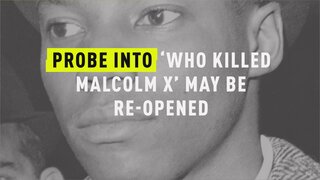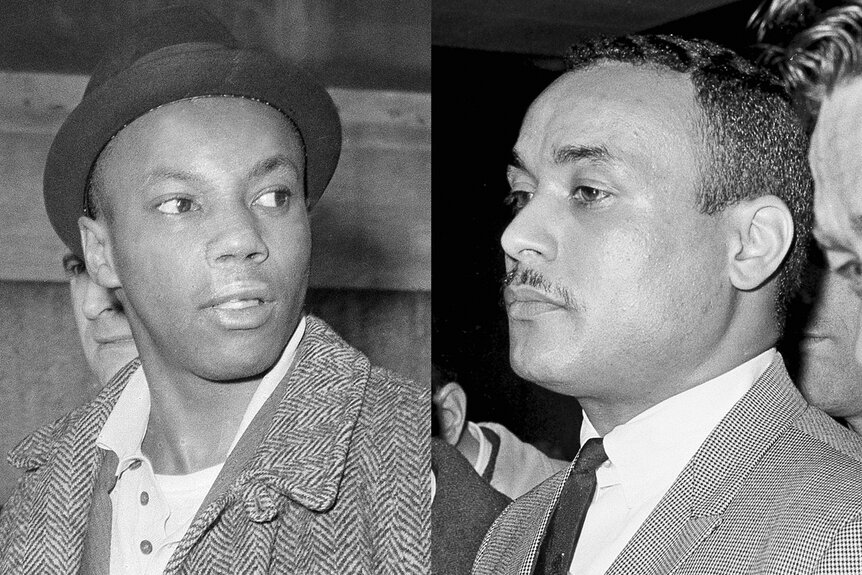Create a free profile to get unlimited access to exclusive videos, breaking news, sweepstakes, and more!
2 Men Convicted Of Malcolm X's Assassination Exonerated
The Manhattan D.A. began re-investigating the case nearly two years ago after a Netflix documentary unearthed documents that likely would have prevented the convictions of Muhammad A. Aziz and Khalil Islam.

Update: A Manhattan judge officially tossed out the convictions of Muhammad A. Aziz and Khalil Islam for the murder of Malcolm X on Thursday, Nov. 18.
Thanks in part to a Netflix documentary, two of the men long considered wrongfully convicted of roles in Malcolm X's 1965 assassination will be exonerated in the case.
Manhattan District Attorney Cy Vance announced his intention Thursday to petition the courts to vacate the convictions Muhammad A. Aziz (convicted under his name at the time, Norman 3X Butler), 83, and Khalil Islam (convicted under his previous name, Thomas 15X Johnson), who died in 2009 at the age of 74, on Thursday, reported the New York Times and NBC News.
Aziz, Islam and a third man who confessed to his part in the murder, Mujahid Abdul Halim (then known as Talmadge "Thomas Hagan" Hayer), 81, were convicted of Malcolm X's assassination in 1966 and sentenced to life in prison, according to NPR. Aziz was released in 1985, Islam in 1987 and Halim in 2010.
But only Halim, who was shot during the attack by one of Malcolm X's bodyguards, was captured at the site of the murder. He denied at trial that either Aziz or Islam were involved, and later named his alleged accomplices in sworn affidavits to famed criminal defense lawyer William Kunstler — who had once represented Malcolm X and later represented his daughter, Qubilah Shabazz after her arrest for attempting to assassinate Louis Farrakhan — when Kunstler attempted to reopen Aziz and Islam's case in the late 1970s. (Kunstler failed to persuade a judge to clear either man in 1978 and neither of Halim's alleged accomplices was reportedly investigated at that time.) Halim insisted in multiple interviews throughout the 1970s and 80s that Aziz and Islam were innocent, according to the Innocence Project.
Aziz and Islam always maintained their innocence. Aziz had multiple alibi witnesses, one of whom testified to the fact that he had been seen at Jacobi Hospital in the Bronx for an injured foot the night before the assassination; he said he was at home resting said foot, according to NPR. Islam was also at home, suffering from rheumatoid arthritis that left him hardly able to walk, according to an interview he gave to New York Magazine before his death.
They were convicted anyway. Both men reportedly spent a significant amount of time in solitary confinement in upstate New York prisons before their release.
Many people doubted the guilt of Aziz and Islam from early on, and calls to reinvestigate the crime persisted even after the courts refused to vacate their convictions in 1978. Though many people — Including Malcolm X's widow, Betty Shabazz — blamed Nation of Islam leader Louis Farrakhan, or suggested the assassination was the work of either the FBI or the New York City Police Department, due in part to their infiltration of Malcolm X's inner circles, Halim swore in his affidavits that the plot to assassinate Malcolm X was the work of four men from the New Jersey branch of the Nation of Islam and a fifth who knew about it.
Aziz and Islam were part of the group's Harlem mosque, where Malcolm X had preached and with which he had split. There was no evidence that they had any relationship with the men from the New Jersey mosque, and multiple people told author and historian Manning Marable that Malcolm X's people had barred anyone from the Harlem mosque from the ballroom where he was speaking when he was killed.
Marable was the first to widely publish the names of Halim's alleged co-conspirators in his 2011 biography, "Malcolm X: A Life of Reinvention," stating that the triggerman was a Newark man known in 1965 as William Bradley; Bradley later changed his name to Al-Mustafa Shabazz and denied the accusations at the time of Marable's book. (He died in 2018, but his lawyer again denied the allegations to the New York Times.)
One of Marable's main sources for the information about Bradley, historian Abdur-Rahman Muhammad, went on to host a docuseries on the assassination (which landed on Netflix in 2020) directed and produced by Phil Bertelsen and Rachel Dretzin. That docuseries, "Who Killed Malcolm X?" led The Innocence Project to meet with Manhattan D.A. Cyrus Vance in 2020 to discuss an investigation into the two men's convictions, according to ABC News.
The investigation substantiated many of Marable's and Muhammad's conclusions about the crime, according to the Times. A defense witness testified that the man he saw shoot Malcolm X was dark-skinned, stocky and had a "deep" beard, which did not match the description of Islam — but did match Bradley's description, on whom the FBI already had a file. That file, which was opened for the Vance investigation, showed that the FBI knew Bradley was a suspect and they had an informant who said as much, but they did not share that information with the NYPD or Manhattan prosecutors at the time.
The investigation also turned up another alibi witness that could place Aziz at his home — which was not close to the Audubon Ballroom in Washington Heights, where Malcolm X was killed — at the time of the assassination.
Unfortunately, much of the other evidence in the case had been lost or destroyed before the 2020 investigation, and many of the principles and witnesses — including Malcolm X's widow, Betty Shabazz, Islam and Bradley — had died.
Still, the 22-month investigation determined that Aziz and Islam likely would not have been convicted if the evidence in the possession of authorities at the time had not been kept from the defense.
“This points to the truth that law enforcement over history has often failed to live up to its responsibilities,” Vance told the Times. “These men did not get the justice that they deserved.”






















